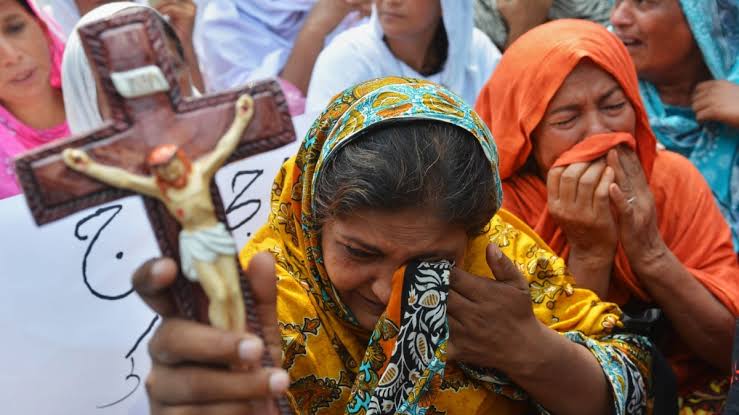By: Kashif Nawab
In the heart of South Asia, Pakistan stands as a nation adorned with diversity, culture, and a rich history. Yet, beneath its vibrant facade lies a stark reality for religious minorities, marred by discrimination, persecution, and vandalism. This piece endeavors to cast a spotlight on the challenges confronting religious minorities in Pakistan, urging for concerted action to safeguard their rights and ensure equality.
Pakistan, predominantly Muslim, boasts a mosaic of religious minorities including Christians, Hindus, Sikhs, Ahmadis, and others. Despite constitutional assurances of religious freedom and equal rights, the ground realities tell a different story. Discriminatory laws, societal biases, and extremist ideologies have fostered an inhospitable environment for religious minorities, leaving them susceptible to marginalization.
One of the foremost hurdles faced by religious minorities in Pakistan are the blasphemy laws. Enacted in the 1980s, these laws criminalize acts deemed blasphemous against Islam, carrying severe penalties including life imprisonment and death. While purportedly intended to safeguard religious sentiments, these laws have often been wielded to target religious minorities, settle personal scores, and stifle dissent. Accusations of blasphemy have triggered violence, mob assaults, and extrajudicial killings, with scant accountability for the perpetrators.
Beyond blasphemy laws, religious minorities encounter systemic discrimination in various spheres of life including education, employment, and housing. Discriminatory practices in the education sector often ostracize minority students, with reports of textbooks propagating religious intolerance and animosity. In the job market, religious minorities confront employment barriers, relegated to menial roles with meager wages and limited prospects for advancement. Moreover, instances of forced conversions and underage marriages of girls from minority communities persist, exacerbating their vulnerability and insecurity.
The plight of religious minorities is further compounded by the surge of religious extremism. Radical factions peddling radical ideologies target minority groups, their places of worship, instilling fear and uncertainty within these communities. Attacks on churches, temples, and shrines have become alarmingly frequent, with negligible repercussions for the assailants. The government’s failure to furnish adequate protection to religious minority enclaves has only emboldened extremist elements, perpetuating a vicious cycle of violence and persecution.
Despite these challenges, endeavors—both domestic and international—have been undertaken to ameliorate the plight of religious minorities and foster tolerance and coexistence. Civil society organizations, human rights advocates, and religious leaders have spearheaded efforts to champion the rights of religious minorities and challenge discriminatory laws and practices. International pressure and scrutiny have also compelled the Pakistani government to undertake measures to safeguard religious minorities and uphold their rights.
However, substantial efforts are imperative to address the underlying causes of discrimination and persecution faced by religious minorities in Pakistan. Reforms within the legal framework, including the repeal or revision of blasphemy laws, are imperative to ensure the protection of religious freedom and expression for all citizens.
Furthermore, initiatives to promote education and economic opportunities for religious minorities are pivotal to redressing the systemic disparities they encounter. Educational programs advocating religious tolerance and diversity can help debunk prejudices and cultivate a culture of inclusivity and acceptance. Additionally, endeavors to empower religious minority communities economically can mitigate poverty and marginalization, bolstering their resilience against discrimination and violence.
In conclusion, the plight of religious minorities in Pakistan remains precarious, with systemic discrimination, persecution, and posing formidable challenges to their safety and well-being. Addressing these challenges demands collective action from the government, civil society, religious leaders, and the international community. Upholding the tenets of equality, justice, and religious freedom is not only a moral imperative but also indispensable for fostering a peaceful and inclusive society in Pakistan. Only through concerted action and solidarity can we envision a brighter future for religious minorities in Pakistan, upholding the virtues of tolerance, diversity, and reverence for all.


